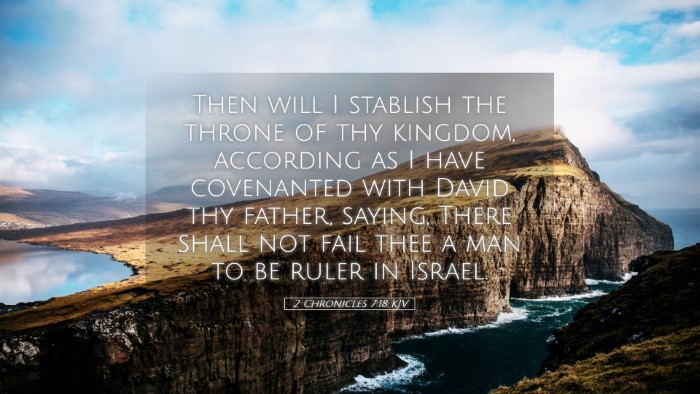Commentary on 2 Chronicles 7:18
Verse: "Then will I establish the throne of your kingdom, according as I have covenanted with David your father, saying, There shall not fail thee a man to be ruler in Israel."
Introduction
This significant verse falls within the broader context of Solomon's dedication of the temple and God's response to his prayers and sacrifices. The promise here is foundational regarding God's covenant with David and the continuity of his lineage in ruling Israel. In this commentary, we will explore various insights drawn from public domain commentaries by Matthew Henry, Albert Barnes, and Adam Clarke, examining the theological implications and historical context of this promise.
Theological Significance
The promise of a lasting dynasty is not merely political; it is deeply theological. It reflects God's faithfulness to His covenantal promises. Matthew Henry emphasizes the enduring nature of God's promises, stating that God's engagements are "yea and amen" and always fulfilled in the divine timeline.
Albert Barnes notes that this verse reaffirms the conditional promises made to David concerning his descendants. It highlights that while the throne will not lack an heir, this promise is contingent upon the faithfulness of the people and their leaders to follow God's statutes.
Covenant with David
The reference to the covenant with David is crucial in understanding this passage. Adam Clarke reminds us that God’s covenant with David, as found in 2 Samuel 7, applied not only to David's immediate lineage but also carried messianic implications, pointing to the future reign of Christ as the ultimate fulfillment of this promise.
- Historical Context: The context of 2 Chronicles is the establishment of the temple and the unification of Israel under Solomon's leadership, emphasizing peace and God's presence among His people.
- Continuity of Leadership: The promise of a perpetual throne suggests stability in governance, contingent upon the nation's faithfulness to God.
Conditionality of the Promise
The verse also serves as a reminder of the conditionality of God's promises. While God assures Solomon of ongoing leadership, it is intrinsically linked to obedience. Matthew Henry articulates that disobedience to God’s commandments can lead to the forfeiture of blessings. God’s promises are indeed steadfast, yet they require human responsibility and fidelity.
Albert Barnes elaborates that although the promise is affirmative, it is crucial to recognize the necessity of maintaining a covenant relationship characterized by loyalty and righteousness. When leaders and people fall away from this path, the consequences can be grave, as seen in subsequent historical accounts.
Implications for Worship and Leadership
This promise also holds implications for worship and leadership among God's people today. Adam Clarke mentions the importance of Solomon’s prayers and sacrifices at the dedication of the temple, suggesting that such acts must precede the acknowledgment of God’s presence and favor.
Church leaders today can draw lessons from Solomon's example of humility and dedication. The establishment of one’s leadership should not only strive for political or social stability but seek the approval and guidance of God in every undertaking.
The Legacy and Fulfillment in Christ
Finally, the ultimate promise of a ruler in Israel finds its greater fulfillment in Jesus Christ. The New Testament often reflects back on the promises made in the Old Testament regarding David's lineage. Matthew Henry emphasizes that Jesus, as the Son of David, fulfills this promise in an everlasting kingdom characterized by justice and peace.
In summary, the verse is heavily laden with theological implications and speaks profoundly to various facets of Israel’s history, God's covenantal faithfulness, and the necessary conditions for the realization of divine promises.
Conclusion
2 Chronicles 7:18 serves as a vital reminder of God's faithfulness and the responsibility that accompanies divine promises. As we study this verse, let us reflect on our commitment to remain within God's covenant, recognizing the impact of obedience on our lives and communities. The continuity of leadership, worship, and faith in God's promises are not merely historical themes but are profoundly applicable to contemporary faith practice and theological reflection.


